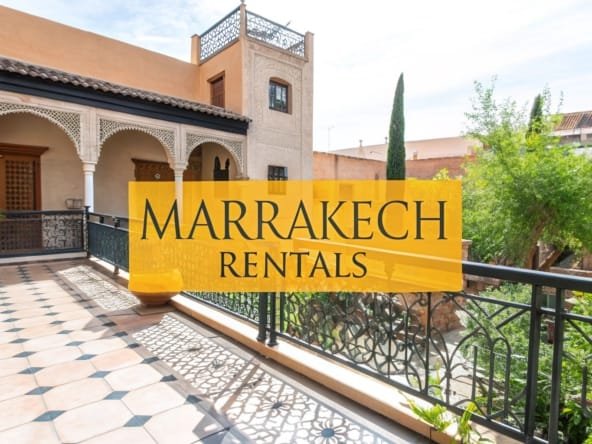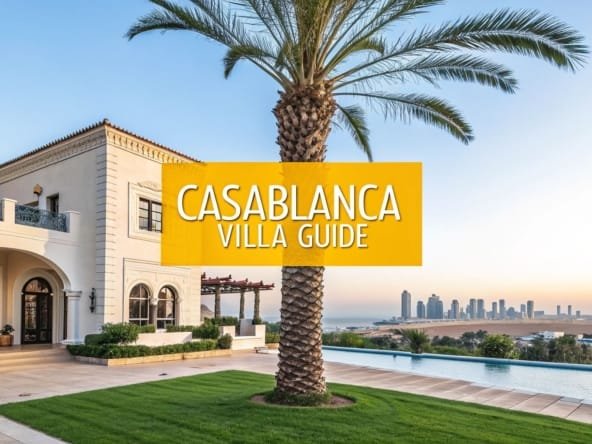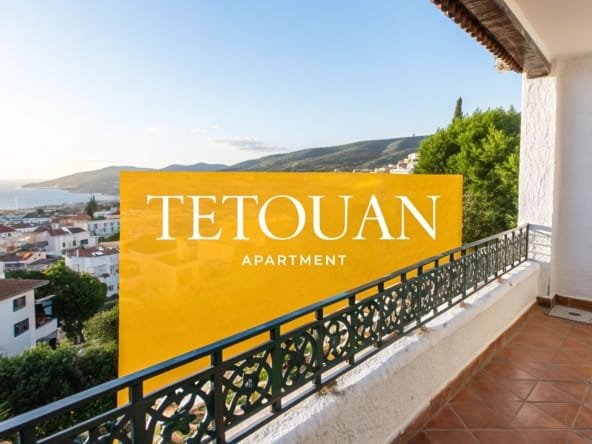Investing in Marrakech's new-build property market—what we call immobilier neuf marrakech—is an opportunity to own a piece of a city where modern luxury and timeless tradition live side-by-side. Whether it’s a chic apartment in the buzzing Gueliz district or a private villa tucked away in a gated community, these properties offer more than just a home; they represent a smart investment backed by steady international demand.
Getting to Grips with the Marrakech New-Build Market
Before you even start looking at listings, it’s crucial to get a real feel for what’s happening on the ground. Marrakech isn’t just a postcard-perfect tourist spot; it's a city in motion, a growing urban hub pulling in serious investment. This energy is what makes it such a compelling place for real estate.
What really draws people here is the quality of life. Think about it: fantastic weather, a deep cultural tapestry, and modern amenities all in one place. This isn't a fleeting trend; it’s a sustained appeal that keeps the property market strong and vibrant.
What’s Fuelling the Growth?
So, what's really behind the consistent demand for new properties here? It’s not just one thing, but a powerful mix of factors that make Marrakech a solid bet for buyers.
- A Global Magnet for Tourism: Marrakech’s worldwide fame brings a constant stream of visitors. Many fall in love with the city and decide to invest, which keeps the rental market hot and pushes property values up.
- Major Infrastructure Upgrades: The city is always improving. We're seeing better transport links and new business districts popping up, which makes living and getting around Marrakech easier and more appealing.
- A Stable and Welcoming Investment Environment: Morocco’s economic stability, coupled with government policies that encourage real estate development, gives both local and international buyers a sense of security.
When you put these pieces together, you can see why a new-build property isn't just a purchase, it's a strategic move. For a more detailed breakdown, explore our comprehensive guide to new property in Marrakech to see why the opportunity is so attractive.
Key Marrakech Neighbourhoods for New Builds
Choosing the right neighbourhood is just as important as choosing the right property. Each area in Marrakech offers a distinct lifestyle and attracts a different kind of buyer. Understanding these nuances is key to finding the perfect fit for your investment goals.
Here's a quick comparison to help you get started:
| Neighbourhood | Property Types | Average Price Range (New Build) | Best For |
|---|---|---|---|
| Gueliz | Modern apartments, lofts | €2,000 – €3,500 / m² | Young professionals, investors seeking rental income |
| Hivernage | Luxury apartments, penthouses | €3,000 – €5,000+ / m² | High-end buyers, those seeking luxury and prestige |
| Route de l'Ourika | Villas, gated community homes | €1,800 – €3,000 / m² | Families, buyers looking for space and tranquillity |
| Targa | Mid-range apartments, villas | €1,500 – €2,500 / m² | First-time buyers, families seeking value |
This table gives you a snapshot, but visiting these areas is the only way to truly understand their vibe. From the cosmopolitan energy of Gueliz to the serene, spacious feel of the Route de l'Ourika, your ideal location is waiting.
Making Sense of Current Prices
Let's talk numbers. The market is definitely on an upward swing. We’re seeing solid price appreciation, and forecasts for 2025 point to continued growth, largely driven by high demand and ongoing urban expansion projects.
Of course, global inflation and rising costs for construction materials have pushed developers to adjust their prices. But it’s not all bad news. Creative financing solutions are emerging, helping new buyers get a foot on the ladder and keeping the market accessible.
One of the biggest mistakes I see people make is assuming all new builds are priced the same. Nothing could be further from the truth. Prices swing wildly depending on the location, the quality of the amenities, and, crucially, the developer's track record. A flat in the ultra-luxe Hivernage will naturally have a much higher price tag than a similar-sized one on the city's edge. It’s a perfect example of why you have to do your homework and understand the unique value each neighbourhood brings.
Getting to Know the Developer Behind the Project
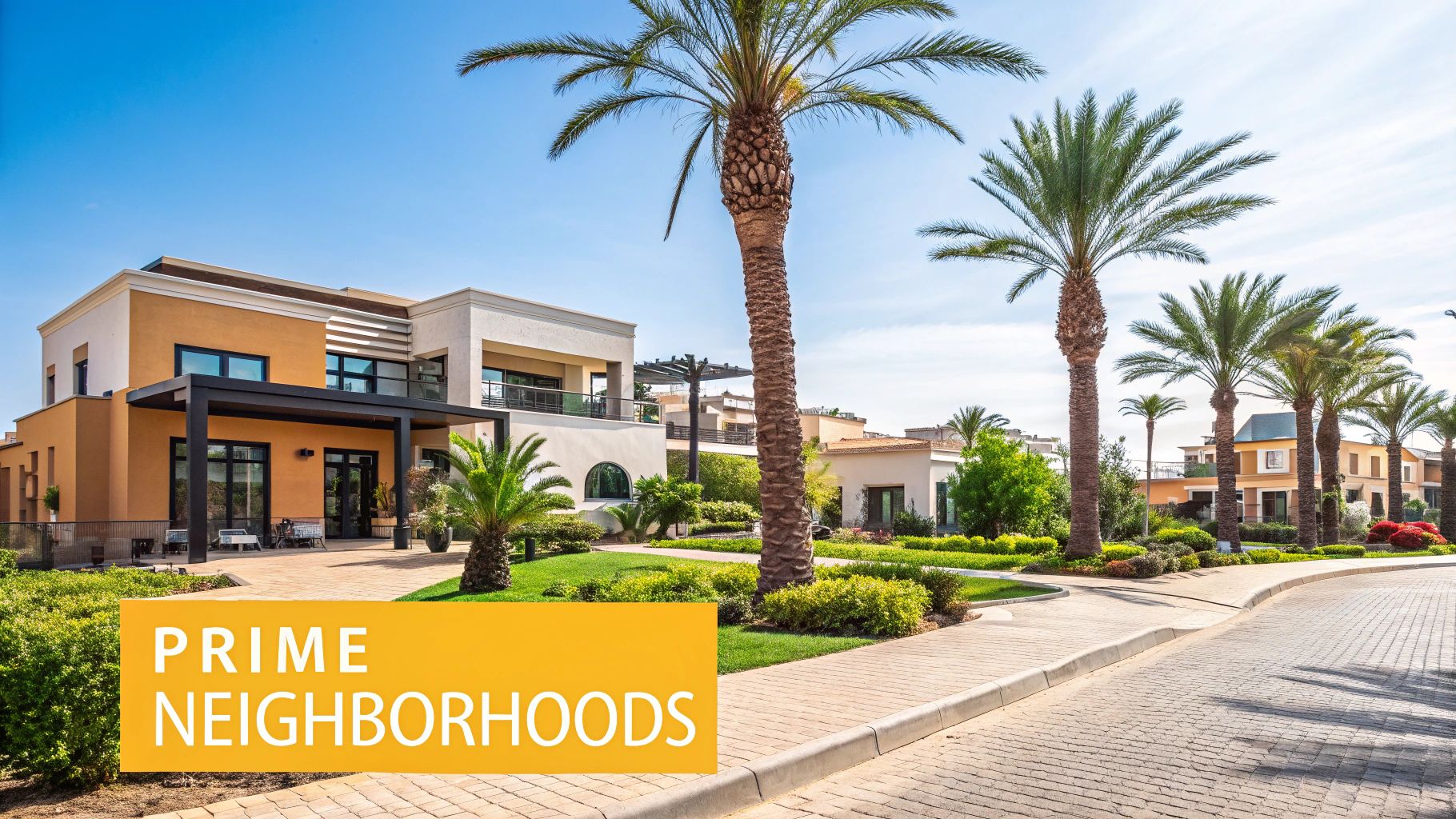
When you're investing in immobilier neuf Marrakech, your single most important decision is choosing the right developer. A great partner means your investment is secure and the property you receive is the one you were promised. A poor one, however, can quickly turn your Moroccan dream into a nightmare. Your first job is to learn how to tell the seasoned pros from the opportunists.
Forget the glossy brochures and slick sales presentations for a moment. A developer’s real reputation is built on their history, not their marketing. You need to look into their track record by visiting their past projects in person.
Don't just do a quick drive-by. Get out of the car, walk the grounds, and if you have the chance, chat with current residents. Get a feel for the build quality and maintenance years after the sales team has moved on. Look at the small things—how has the paint held up to the intense Marrakech sun? Are the gardens and common areas still immaculate? These are the real clues to a developer's long-term commitment to quality.
The Essential Paperwork
A reputable developer will have nothing to hide when it comes to their legal and financial standing. You should never feel hesitant to ask for the core documents that prove their legitimacy and the project's authorisations. In my experience, the best developers are proud of their professionalism and will have this information ready for you.
Here’s what you absolutely must ask for:
- Company Registration: Is their business registration valid and up-to-date?
- Building Permits: Have they secured all the necessary construction permits for this specific project?
- Land Title Deed: You must see proof that the developer holds the definitive title deed, the 'titre foncier', for the land. This is non-negotiable.
- Financial Guarantees: In Morocco, serious developers have a financial completion guarantee ('garantie financière d'achèvement'). This is your safety net, protecting your funds if they were to default before finishing the build.
If a developer balks at providing any of these, consider it a major red flag. This isn't just paperwork; it's the foundation of your investment's security.
Scrutinising the Project Details
Once you feel confident about the developer, it’s time to shift your focus to the specifics of the project itself. Two documents are absolutely critical here: the 'plan de masse' (the master plan) and the 'cahier des charges' (the technical specifications).
The master plan gives you the bird's-eye view of the entire community—where buildings are situated, the layout of amenities, and the allocation of green spaces. The specifications list, on the other hand, is the fine print. It details the exact materials, brands, and finishes for everything from the flooring to the kitchen taps.
I’ve seen buyers get caught out by this. They fall in love with a stunning show home, only to find the ‘cahier des charges’ allows for much cheaper materials. Always compare what you see in the model unit to what’s promised in this legally binding document. Vague terms like “quality tiles” aren’t enough—you need specifics.
Ultimately, there’s no substitute for visiting the construction site yourself. Seeing the work in progress gives you a tangible sense of the project's quality and momentum. It also signals to the developer that you're a serious, engaged buyer. Knowing why Marrakech is the perfect location for your holiday home is the first step, but ensuring it's built to the highest standard is what truly protects your vision. This hands-on due diligence is the only way to invest with total peace of mind.
Navigating the Purchase and Financing Process
Diving into the legal and financial aspects of an off-plan property purchase in Morocco can seem daunting at first, but it's a very established process. The system, known as VEFA (Vente en l'État Futur d'Achèvement), is specifically designed to safeguard both you and the developer. At the heart of it all is the 'notaire' (notary), who serves as the crucial, impartial overseer for the entire transaction.
Your journey really kicks off with the 'contrat de réservation' (reservation contract). This isn't just a simple agreement; it's a legally binding document that secures your chosen property at an agreed-upon price. It’s a pivotal moment. The contract will detail everything from the unit specifications to the total cost and the estimated completion timeline. At this point, you'll pay a reservation deposit, which is held in a secure escrow account by the notaire—not given directly to the developer.
Understanding the Key Legal Documents
With your reservation secured, the process advances toward the final 'acte de vente' (deed of sale). But you don't jump straight there. The VEFA framework is built on a pay-as-you-build model, which is fantastic for buyer security. You only release funds as specific, tangible construction milestones are met.
The role of the notaire can't be overstated. They aren't just a lawyer; they are a public officer appointed by the state. Their duty is to meticulously verify every single document—from the developer’s land title to the building permits—ensuring the entire transaction is transparent and legally sound before any money changes hands.
The journey from initial research to getting your keys involves several key stages, as you can see below.
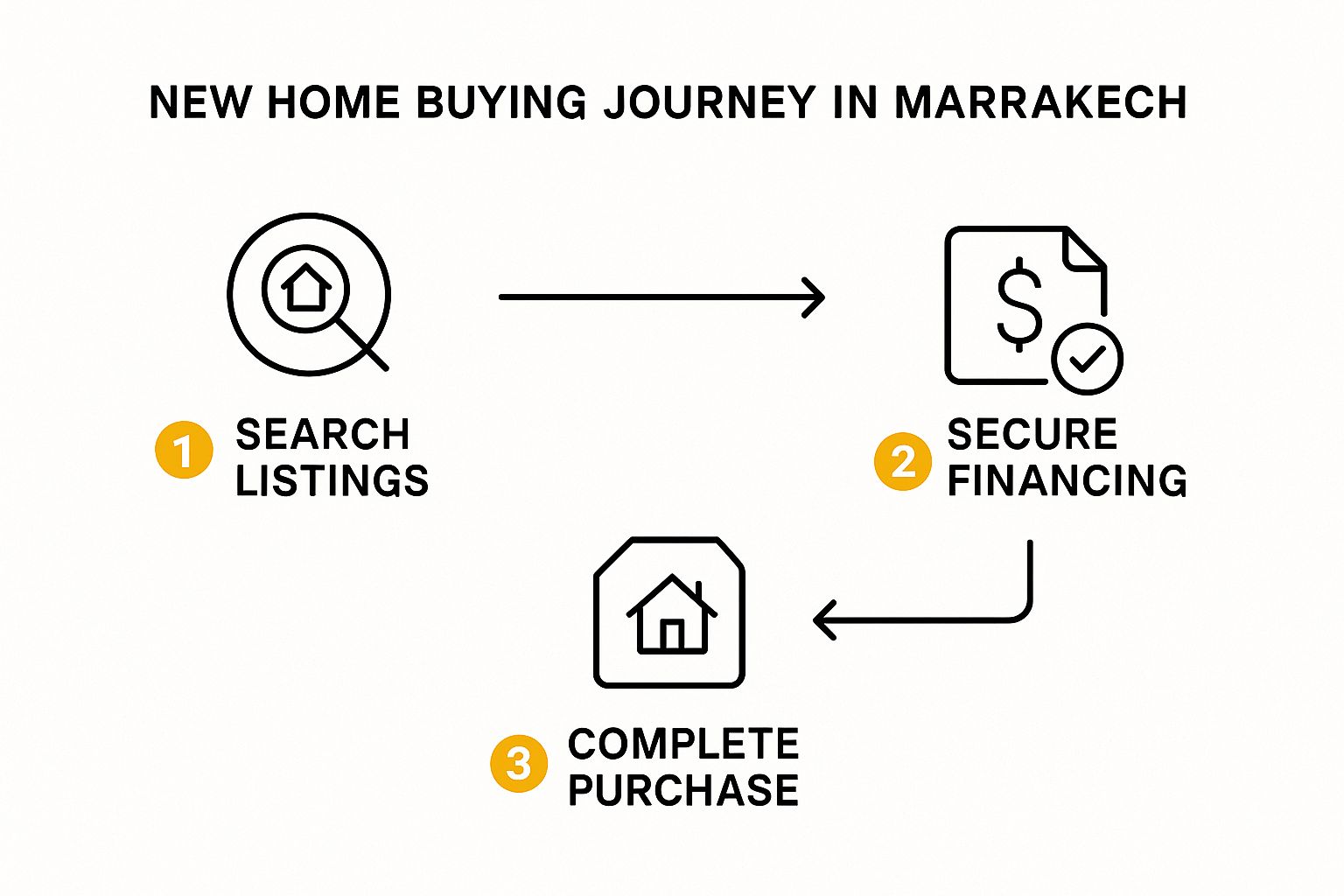
As this illustrates, arranging your financing is a central part of the puzzle, acting as the bridge between finding your dream property and legally making it yours.
Structuring Your Payments and Financing
When buying immobilier neuf Marrakech, the payment schedule is legally defined and tied to concrete construction phases. While there can be minor differences between projects, the structure generally follows a predictable path:
- Foundation Completion: The first major payment tranche is released.
- Structural Work Completion: Another payment becomes due once the main structure is up.
- Final Finishing (Hors d'eau, hors d'air): A further payment is made once the property is watertight and secure.
- Handover ('Livraison'): The final balance is settled when you receive the keys.
This staggered system is designed to minimise your risk. When it comes to financing, both Moroccan residents and international buyers can access mortgages from local banks, though the requirements can vary. Foreign buyers, for instance, are often asked for a larger down payment and should be prepared for thorough checks on their financial standing back home.
Getting a firm grasp of these financial commitments is one of the top reasons to invest in Marrakech real estate in 2024, as proper planning ensures a smooth and profitable venture. My advice? Speak to a Moroccan bank early on. Securing pre-approval not only gives you a clear budget to work with but also signals to developers that you're a serious and credible buyer.
Embracing Sustainable and Modern Living
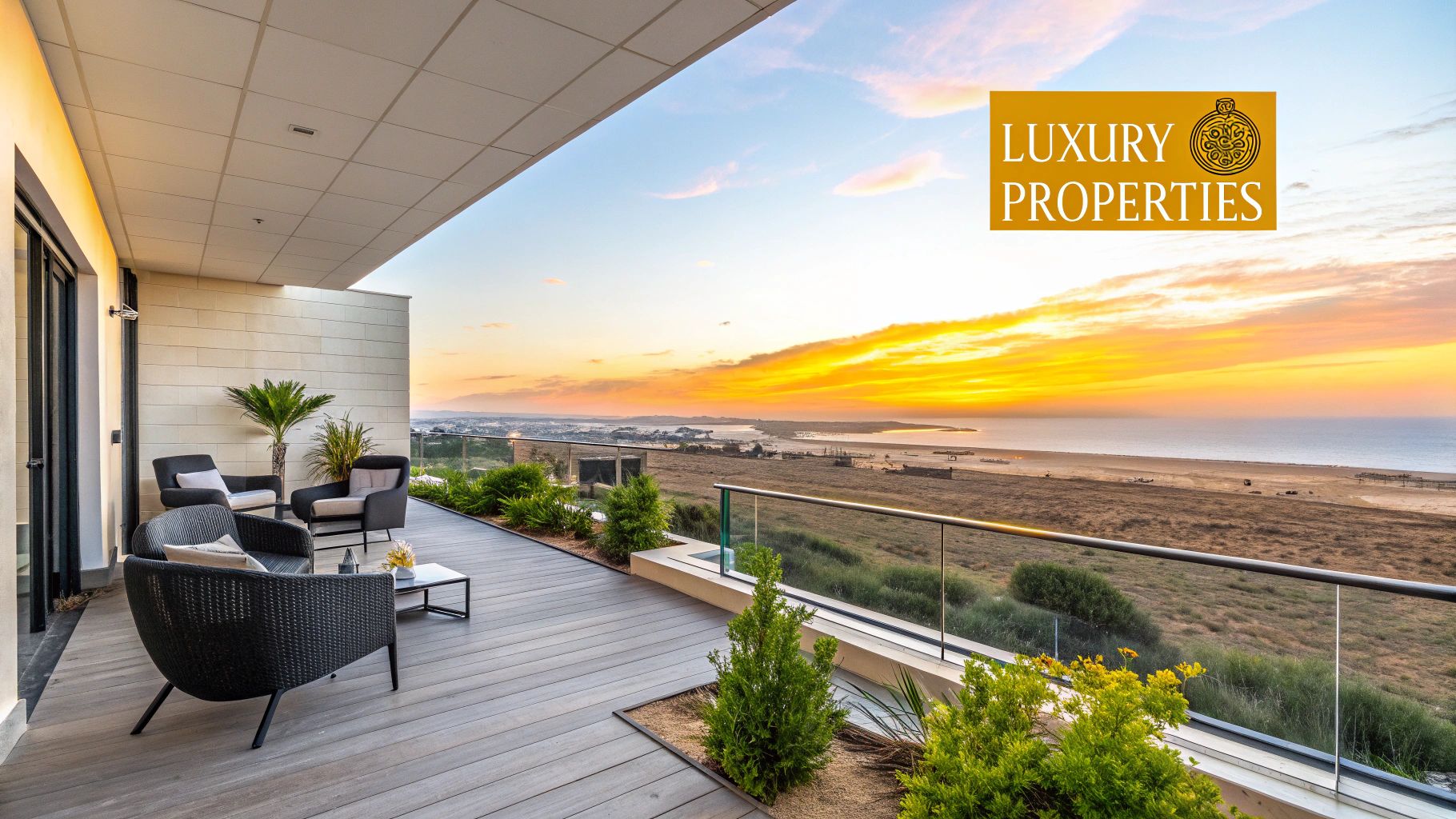
The idea of immobilier neuf Marrakech is no longer just about traditional design and a list of standard amenities. Something bigger is taking place. We're seeing a fundamental shift towards sustainable, eco-conscious living that is genuinely reshaping the city's property market. Developers aren't merely constructing houses anymore; they're crafting intelligent living spaces where luxury and environmental responsibility go hand-in-hand.
This new generation of construction weaves green building innovations right into the architectural fabric of the properties. The goal is to build homes that are not only stunning but also remarkably efficient and healthy to live in. It's a clear response to what buyers like you are asking for—a home that reflects your values without forcing you to compromise on comfort or style.
Green Features That Deliver Real Value
So, what does this actually look like on the ground? It's a smart blend of modern technology and thoughtful design, all aimed at shrinking the property's environmental footprint and, importantly, your long-term running costs.
Some of the most common and effective features you'll find include:
- Advanced Solar Energy Systems: It's becoming increasingly common for new developments to include solar panels, especially for water heating. This simple addition can drastically cut your reliance on the grid and make a noticeable dent in your monthly electricity bills.
- Intelligent Water Conservation: In a climate like Marrakech's, every drop of water counts. Developers are now integrating water-saving tech like low-flow taps and showers, alongside sophisticated drip irrigation systems for gardens and shared green spaces.
- Optimised Natural Lighting and Airflow: Good architecture does half the work. Buildings are now being cleverly positioned to capture maximum natural light, reducing the need for electric lights during the day. Similarly, layouts are being designed to encourage cross-ventilation, which can significantly cut down on air conditioning use during the hot summer months.
The real win here is the dual benefit. You get to reduce your personal environmental impact while also enjoying very real financial savings. Lower utility bills combined with a healthier, more comfortable home is a powerful combination.
The Rise of Eco-Conscious Developments
Marrakech's real estate sector is truly at the forefront of sustainability in North Africa. A growing number of new residential projects are being built to comply with high environmental standards, such as the Haute Qualité Environnement (HQE) certification, which rigorously assesses energy efficiency and ecological impact.
Key green technologies—think solar water heaters, LED lighting throughout, and drought-resistant landscaping—are becoming the new standard, not the exception. This proactive push doesn't just lower the city's carbon footprint; it directly translates into lower utility bills for homeowners, establishing Marrakech as a blueprint for sustainable urban growth. You can explore more about eco-friendly homes on the rise in Marrakech to see how this trend is unfolding.
Getting the Keys and Managing Your New Property
Watching the construction scaffolding finally come down is a huge milestone, but your work isn’t quite finished. The final handover is where all your planning pays off, and it demands your full attention to ensure the property you’ve been promised is the one you actually receive. This is your chance to make sure every detail is perfect.
This critical handover process is called the ‘livraison’ in Morocco. It’s your official, formal opportunity to walk through the property with the developer, not just for a quick look, but for a detailed inspection before you accept the keys.
Anything you find—from a small scratch on a tile to an electrical socket that doesn’t work—gets noted down. This list of issues, or ‘réserves’, is documented in a formal report called the ‘procès-verbal de livraison’. The developer is then legally required to fix every item on that list within an agreed-upon timeframe. Don't be shy here; this is your moment to be meticulous.
From Handover to Legal Ownership
Once the handover is complete and you're satisfied with the property, the final legal step is securing your definitive title deed, the ‘titre foncier’. Your notaire handles this, registering the property in your name at the land registry (‘conservation foncière’). This document is the ultimate proof of ownership in Morocco and gives you complete legal security.
If you've bought an apartment or a villa within a larger complex, you'll also become part of the homeowners' association, known as the ‘syndic de copropriété’.
The 'syndic' manages and maintains all the shared spaces—the gardens, pools, security, and building exteriors. It's really important to get a clear picture of the co-ownership rules and the monthly fees involved, as this is an ongoing cost you’ll need to budget for.
Tapping into Marrakech's Rental Market
For many, buying in Marrakech isn't just about a beautiful holiday home; it's a smart investment. The short-term rental market here is booming, and understanding what renters want is the key to getting the best possible return.
A quick look at the data for Marrakech's Airbnb market reveals some clear trends. One-bedroom apartments are the most common, representing 30.8% of listings, which shows a huge demand from couples and solo travellers. In fact, one- and two-bedroom properties combined make up 60.2% of the entire market.
That said, there's still a healthy appetite for larger spaces. Properties with three or more bedrooms account for nearly 25% of all listings, catering to families and bigger groups. You can explore more about Marrakech's dynamic rental market to see these trends for yourself.
This kind of insight is gold when you're setting up your property. If you have a two-bedroom apartment, for instance, furnishing the second bedroom with twin beds or a high-quality sofa bed could make it attractive to both families and groups of friends, widening your potential audience.
Finally, there are the practicalities of setting everything up. You’ll need to:
- Get Connected: Sort out your contracts for water, electricity, and internet with the local utility companies.
- Furnish the Space: Choose furniture that’s both stylish and durable enough to withstand rental use. Think practically.
- Decide on Management: Will you handle bookings, check-ins, and cleaning yourself, or hire a local property management company to take care of it all?
Navigating these final details carefully is what turns a property purchase into a successful, hassle-free investment in Marrakech's vibrant real estate scene.
Common Questions About Buying Immobilier Neuf
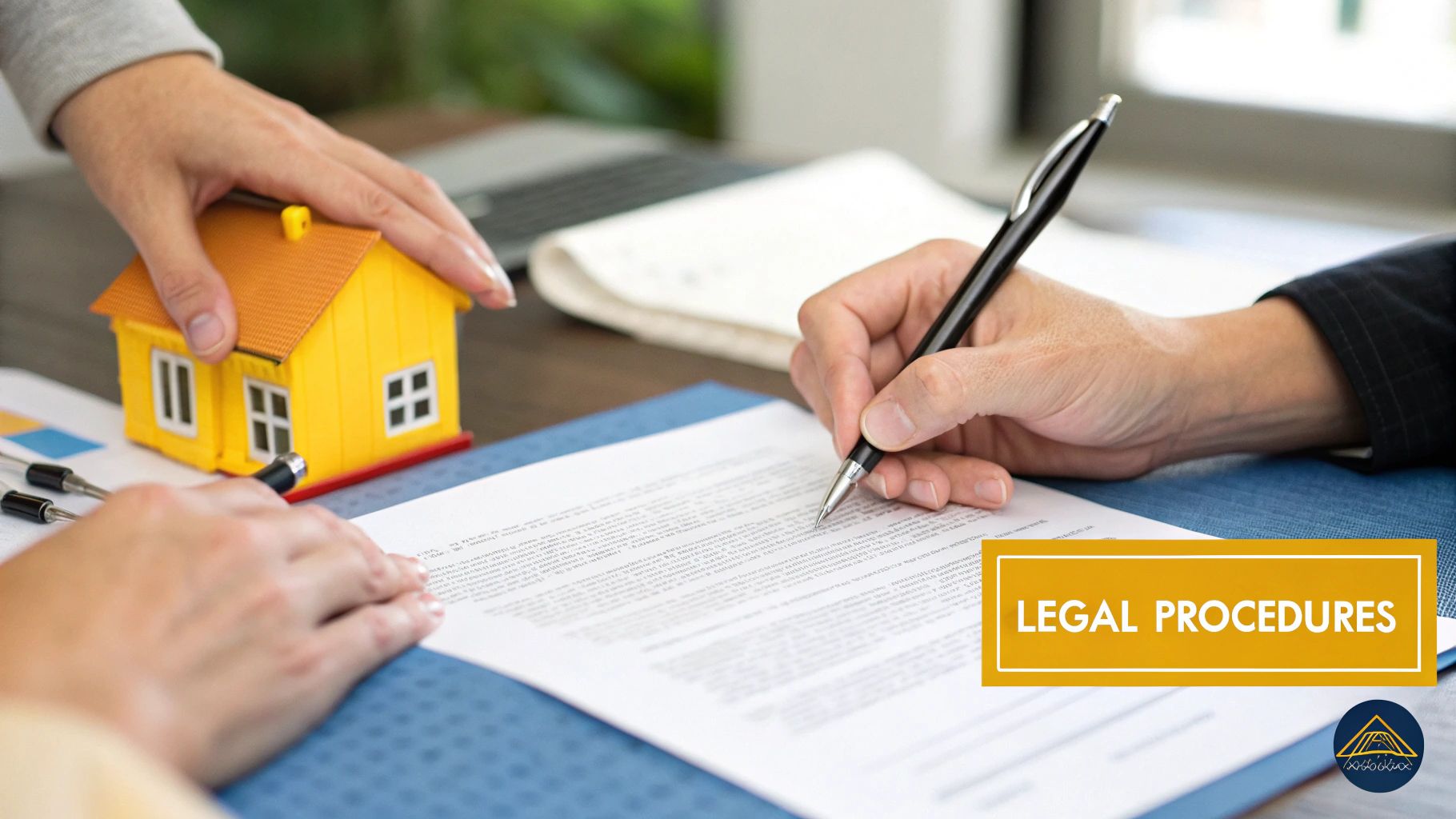
Stepping into the world of immobilier neuf Marrakech naturally brings up a lot of questions. Whether you're an international investor or a local buyer, the same concerns often surface—from understanding legal protections to uncovering the true final cost of a property.
Getting honest, straightforward answers is the only way to move forward with confidence. We’ve compiled some of the most common questions we field from clients, cutting through the jargon to give you the clarity you need for such a significant investment.
What Is the Most Important Legal Safeguard?
When you buy off-plan in Morocco, the entire process—known as VEFA (Vente en l'État Futur d'Achèvement)—is designed with buyer protection in mind. The single most crucial element of this protection is the involvement of the 'notaire' (notary). Think of them not just as a lawyer, but as a neutral, state-appointed official whose sole job is to guarantee the legality and fairness of the transaction.
Another key protection is the payment structure. You don't hand over a lump sum upfront. Instead, payments are made in stages, tied directly to proven construction milestones. This, combined with the developer's mandatory financial completion guarantee (‘garantie financière d'achèvement’), dramatically reduces your financial exposure.
The ultimate prize is the 'titre foncier' (the definitive title deed), which is your indisputable proof of ownership. A notaire simply won't let the sale complete until every legal box is ticked, including the all-important 'permis d'habiter' (certificate of occupancy). This ensures your investment is legally airtight.
Are There Hidden Costs I Should Know About?
This is a big one. While reputable developers aren't trying to hide things, there are standard transactional costs that go beyond the advertised price. You absolutely must factor these into your budget from the very beginning.
Here’s what to expect:
- Notary Fees: This fee covers the notaire’s extensive legal work in verifying every document and registering the sale. It’s typically calculated as a percentage of the property's value.
- Registration Duties & Land Registry Fees: These are government taxes paid to the 'conservation foncière' to officially record you as the new owner.
- 'Syndic' Fees: These are the ongoing monthly charges for the upkeep of the building’s common areas—think gardens, pools, and security. They kick in once you take possession.
A trustworthy agent won't hesitate to give you a detailed breakdown of these anticipated costs before you even think about signing a reservation contract. Always insist on this written estimate to avoid any unwelcome surprises down the line.
Is Buying Off-Plan Risky For Foreigners?
Not if you do it right. The Moroccan legal system for property is well-established and treats foreign nationals and Moroccan citizens exactly the same. The VEFA law itself was created specifically to make off-plan purchases a secure and transparent process for everyone.
From our experience, the biggest risks for international buyers stem from two common mistakes: skipping proper due diligence on the developer or trying to cut corners by not using an independent, reputable notaire. When you partner with experienced professionals who live and breathe the local market, you can invest in immobilier neuf Marrakech with just as much security as any local.
Navigating the Marrakech property market successfully comes down to expertise and local knowledge. At Rich Lion Properties, we provide the hands-on guidance you need for a smooth and secure transaction. Explore how we can help by visiting us at https://richlionproperties.com and let's start your journey.

